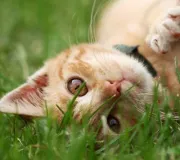Saint Lucie County is home to many beautiful birds, both wild and domestic. Parrots are lovely and intelligent, and make wonderful pets. They rank among the most intelligent bird species, along with ravens, crows, and magpies, and are best known for their uncanny ability to mimic human speech. These colorful beauties have very long lifespans, so if you are considering getting a parrot, make sure you are able to truly commit to your feathered friend. Parrots are very social animals, and need quite a bit of attention. You’ll want to make sure you have room for a fairly large cage, as these enchanting creatures do need ample space in order to thrive.
Diet
One good method to ensure your feathered buddy is getting adequate nutrition is to give him three bowls. The first bowl should have water, the second should contain pellets, nuts and seeds, and the third would be for fresh fruits and veggies. You can also give your parrot a variety of treats. Apples, berries, bananas, cherries, even bits of dairy and small amounts of cookies are safe. Avoid alcohol, coffee, chocolate, caffeine, and avocado, as these are all very toxic for your winged pal.
Toxins
Many things you may find in a typical household can be toxic or even deadly to parrots. The list of possible toxins is quite long, but some of the more common household items which are dangerous to parrots include aerosol sprays, air conditioning, alcohol, small balls or beads, cat litter, candles, oil, halogen lamps, pens, and potpourri. Avoid anything pine scented. Cats are also dangerous to parrots, and not just in a predatory manner. Cats often carry bacteria which are harmless to humans, but can be deadly to birds. Make sure not to let Kitty play with your bird, because even a swat from Kitty’s paw could transmit the bacteria.
Clipping
Clipping is necessary for your parrot’s safety. Unclipped parrots can injure themselves very easily in a typical house. Pots and pans, open doors, ceiling fans, and even windows can prove hazardous to an indoor bird.
Our Advice on Basic Parrot Care in 2024
What specific species of parrots make the best pets?
Certain species of parrots are particularly well-suited as pets due to their sociable nature and adaptability to living in a human environment. These include the African Grey, known for its exceptional intelligence and ability to mimic human speech, and the Budgerigar (Budgie), which is smaller, less demanding, and a good choice for beginners. Cockatiels, with their friendly demeanor and minimal space requirements, also make great companions. Each of these species has unique care needs, but their social nature and relative ease of training make them popular choices for pet owners.
How much time and attention do parrots require on a daily basis?
Parrots require significant time and attention daily to remain healthy and happy. Ideally, a minimum of two hours of direct interaction with their owners is recommended, which can include playing, training, and simply spending time together. Additionally, parrots benefit from having a varied environment with opportunities for mental stimulation, such as toys and puzzles, to prevent boredom and promote physical activity. Their social nature demands regular engagement; neglecting this can lead to behavioral issues and depression. Consistent, daily interaction and enrichment are crucial for their well-being.
What are the signs that a parrot may be experiencing health issues?
Signs that a parrot may be experiencing health issues include changes in eating or drinking habits, abnormal droppings, decreased activity or lethargy, plucking or excessive loss of feathers, changes in breathing or persistent coughing, and any unusual lumps or swellings. Behavioral changes, such as increased aggression or a sudden lack of interest in interaction, can also indicate health problems. Early detection is key to successful treatment, so if these symptoms are observed, it’s important to consult a veterinarian promptly. Our clinic in Treasure Coast, FL, specializes in avian care and is ready to assist with any concerns regarding your parrot’s health.
What is the average lifespan of pet parrots, and what factors can influence a bird’s longevity in captivity?
The average lifespan of pet parrots varies widely among species, ranging from 10 to 15 years for smaller parrots like budgies and cockatiels, to 50 years or more for larger species such as macaws and African Greys. Factors influencing a bird’s longevity in captivity include diet, with a balanced intake of fruits, vegetables, and specially formulated pellets being crucial; environmental enrichment, including toys and interaction to prevent stress and boredom; and regular veterinary care to address any health issues promptly. Proper care and attention to these factors can significantly extend a parrot’s life.
How can owners properly socialize and train their parrots?
Owners can properly socialize and train their parrots by starting early and using positive reinforcement techniques. Consistent, daily interactions help build trust and form a bond. Training sessions should be short, fun, and rewarding, using treats or favorite foods as incentives for desired behaviors. Introducing new people gradually and in a controlled environment can help broaden a parrot’s social circle. Socialization also involves exposing parrots to various environments and stimuli, ensuring they’re comfortable with different sounds, sights, and handling. This approach fosters a well-adjusted, sociable, and obedient pet.
If you choose to bring one of these lovely, enchanting creatures into your Saint Lucie County home, please feel free to contact us with any questions on your parrot’s care or behavior.


Leave a Reply
You must be logged in to post a comment.